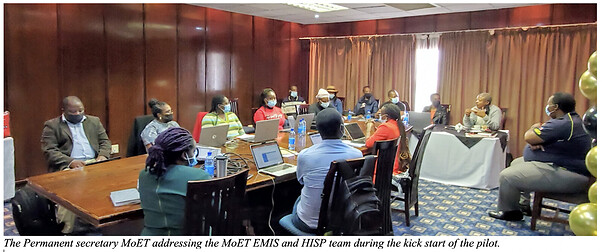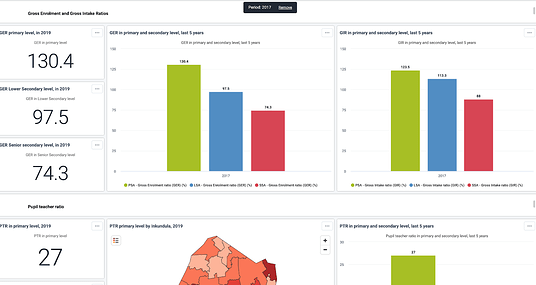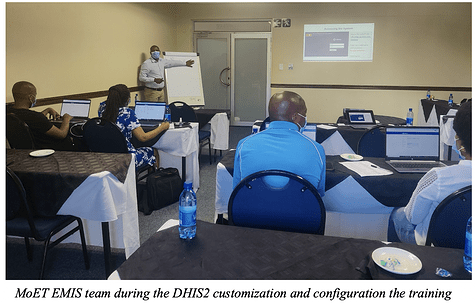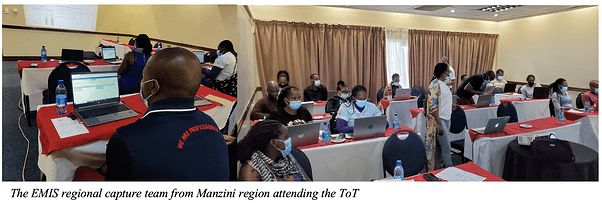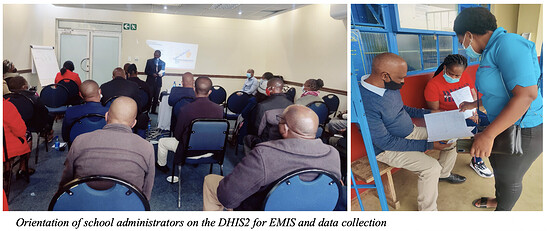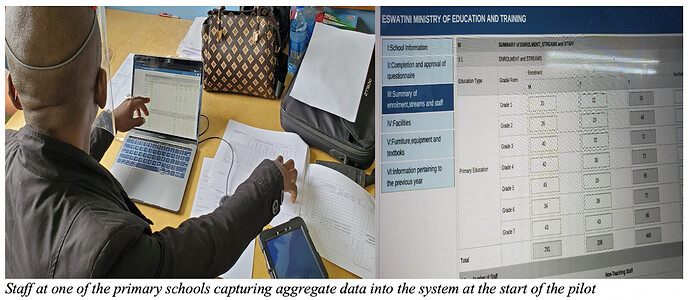“We need to seize this opportunity and fire up and not lose the momentum - we need to shower everyone with the rewards of this DHIS2 intervention, let’s bombard them with facts, information and visualised statistics,” said Mr. Shabalala, the MoET EMIS Manager in Eswatini.
The Ministry of Education and Training (MoET) of Eswatini has been collecting education data from learning institutions on a semi-annual and annual basis using paper registers and aggregate reports which include the MoET annual census form, 16th day tool and INQABA. These were being entered in an MS Access based Education Management Information System (EMIS) at the central level MoET HQ for analysis. The analysed data then be published in the annual statistical yearbooks and mainly used for feedback, policy, planning and decision making and overall monitoring and evaluation of the MoET sector plan.
Over time the Ms Access-based EMIS system became difficult to maintain and keep up- to-date with the growing MOET information/indicators needs such as: Early Childhood Development Education, Special Needs Education, Care and Support for Teaching and Learning (INQABA), Sector Response to HIV and AIDS, Nutrition, Individual learner and staff monitoring with unique identifiers and other SDG4 indicators monitored globally not being tracked and reported on in a timely manner.
Another major challenge has been the use of unique identifiers for students, teachers and schools, which leads to fragmented and disconnected databases making it difficult to track staff or learners throughout the entire continuum of the education system. In Eswatini, the MOET envisioned an individual Personal Identification Number (PIN) driven-system where they could ably track individual learners, teaching and non- teaching staff to ensure holistic support in learning, teacher training and management. The proposed system was required to have the ability to interlink with other existing systems such as the birth registration system, and be accessible at central, regional and school level.
Building on these requirements and recommendations from an extensive EMIS system review conducted between October 2018 to March 2019, the MoET with support from UNICEF Eswatini, proposed the use of DHIS2 as an EMIS through an initial pilot project. This was aimed at improving efficiency in management and use of education data and build the proof of concept to inform the national scale of DHIS2-EMIS.
Following the successful proposal submission and award in June 2020, the University of Oslo, in collaboration with HISP Uganda and HISP Mozambique leveraged on more than 15 years experience in implementation of DHIS2 in the health sector, and learning from the 2 year successful pilot of DHIS2 for Education in Uganda and The Gambia, to support the configuration and deployment of DHIS2 for Education in Eswatini.
The engagements between the implementers (HISP Uganda and UiO) and (MoET and UNICEF Eswatini) started with an online inception meeting sharing the understanding of the system requirements, demonstrating how the system was to be modelled for both the aggregate and individual data collection and analysis, and obtain further clarification on the expected deliverables. The development team then embarked on reviewing the MoET dat collection and reporting forms and indicators and facilitated the revision of all the data collection tools that included:
- Early Child Care Development (ECCD) report form: A tool for reporting the quality of care and infrastructure at day care centres and grade 0. Form completed by school administrators of ECD centres on an annual basis
- I6th day census report form: A tool for reporting enrollment and staff numbers from all government aided schools completed at school level three weeks after schools open at the beginning of the school year
- Annual Education Census tool for primary and secondary with individual learner and staff tracker: Booklet containing a series of questionnaires on school information, approvals, enrollments, furniture, equipment, textbooks, previous year info, individual learner information, teaching and non-teaching staff. These questionnaires are completed by school administrators on an annual basis
- INQABA tool: Self-assessment tool focusing on the implementation of HIV and school health,school feeding programmes, training on life skills etc. Tool completed Head Teachers on a termly basis.
- School assessment for effectiveness: to assess the school quality of teaching and learning effectiveness, financial management and school administration and management. These are used by the inspectors of schools to assess the schools and have been designed as an event programme to score different institutions on the different indicators which will be visualised on the scorecard.
The revision was aimed at reducing duplication and redundancy in the data collected and inclusion of data elements to capture the new indicators.
Following the revisions and updates of the data collection tools, the team configured the approved tools into the DHIS2. A system testing guide was developed and shared with the MoET team to guide system testing and feedback, which further informed finetuning of the system and bug-fixing.
Legacy data from 2012-2019 was imported into the DHIS2 to allow visualization of historical trends of key indicators on the system dashboards. Currently the MoET can view their EMIS data in DHIS2 from (2012 to 2019).
Sample dashboards of the legacy data imported into DHIS2 for EMIS
The COVID-19 pandemic with associated travel restrictions compelled the team to plan remote support for the implementation. As such, several online training sessions were conducted to provide an overview of DHIS2, demonstrate progress of system development and train the team on basic data capture and analysis.
With a gradual decline in COVID-19 cases in Uganda and Eswatini and ease of international travel restrictions, in September 2021, the HISP Uganda and Mozambique teams were able to travel to Eswatini for three weeks to build the capacity of the team and kick start the pilot. HISP Mozambique supported the MoET team to set up the servers, deployed the DHIS2 instance onto the server and conducted a one-week server administration training for the system administrators and IT staff. . Thereafter, a design and customisation training for system administrators, and training of trainers for the regional data capture teams were conducted. Seven (7) MoET staff including the EMIS manager were trained on design and customisation of DHIS2 for Education and equipped with skills to support, update and maintain the system. Seven regional EMIS data capture staff were trained on data capture, analysis and presentation while over 210 school administrators from primary and secondary schools were oriented on the revised tool and the DHIS2.
Following the training, the HISP team together with staff from MoET conducted school visits and further tested the revised tools and the system in 7 selected schools in the Manzini region. During the school visits, learners were trained on how to update their profiles while school administrators were supported to test the ease of data capture using both web and android for both aggregate and tracker data.
Feedback from school administrators was used to further update the data collection tools and the DHIS2 system. Following the school visits, a meeting to share field experiences and key recommendations to guide the pilot implementation was held with the MoET EMIS team and the Permanent Secretary MoET. The pilot was planned to be conducted in over 120 schools (50 secondary, 50 primary and 20 ECDs) in the Manzini region over a period of three months (October - December 2021). Thereafter, an assessment to inform national scale will be conducted in January 2022.
Project Implementation Challenges
- The COVID-19 pandemic which led to restrictions in international travel and prolonged closure of schools with distortion in academic year and delayed the start of the pilot.
- Limited use of the system at school level due to unstable internet connectivity.
Lessons Learnt and Recommendations
- Buy-in and ownership from the MoET central level leadership is key in successful project implementation
- Willingness and funding commitment from UNICEF and other Education development partners is required to achieve national level scale
- A committed and well coordinated EMIS team is needed to support implementation at sub-national and school level
- The learner registers at school level need to be updated to include information captured on the learner profile in the data collection tool
- Clear communication and guidance need to be provided to school administrators regarding management of learner transfers incase learners moves from one school to another
Next steps
- The pilot will be implemented for the next three months until the end of December 2021.
- Final versions of updated data collection tools will be printed and distributed to the pilot schools in the Manzini region.
- The schools with resources like computers, tablets and internet will be supported to capture data at school level while those with limited resources will submit their data to the regional offices for entry into the DHIS2.
- All schools will be provided a user account in the DHIS2 where they can log in, view and use their data at school level.
- Feedback from the pilot will be used to update the system and provide additional requirements to inform adoption of DHIS2 for Education at a global scale
- Pilot assessment and presentation of pilot findings to cabinet for approval prior to the national scale of DHIS2 for Education.
Keep watching the space on our DHIS2 for education segment for the key lessons learnt from the pilot implementation of DHIS2 for EMIS in Eswatini after the assessment.
